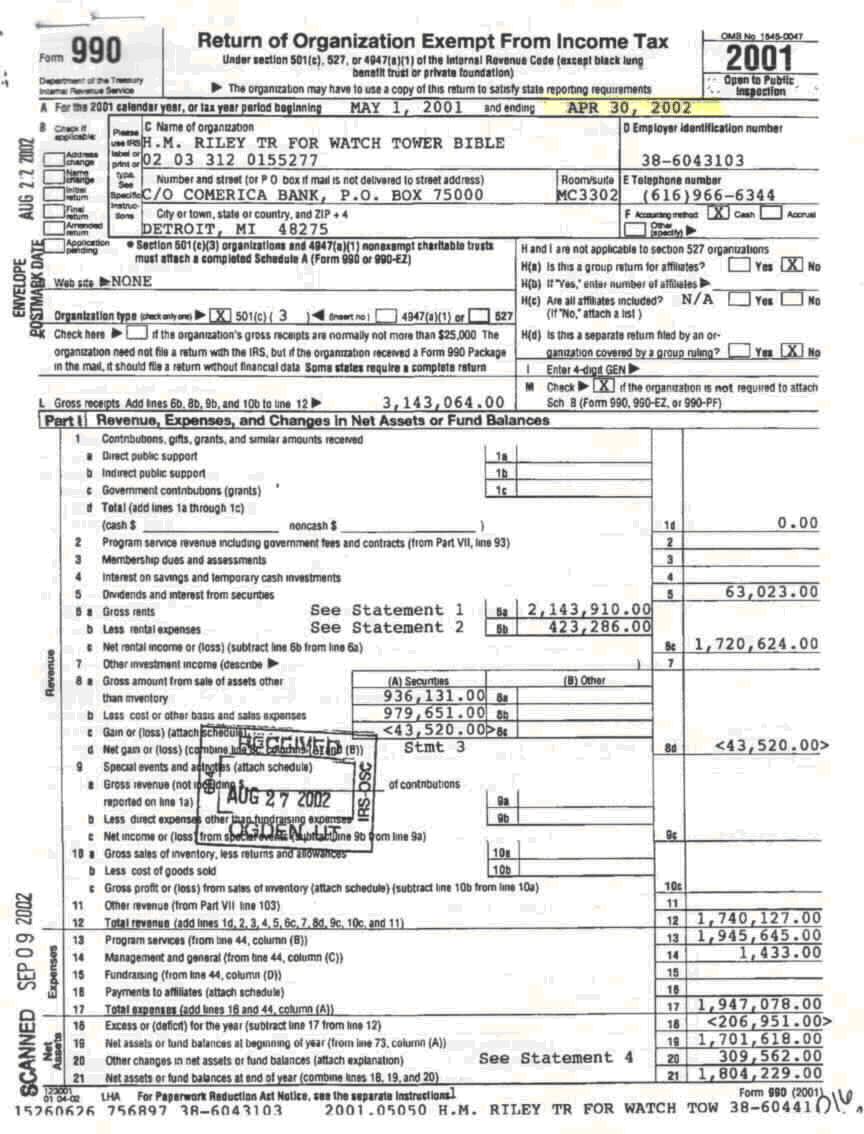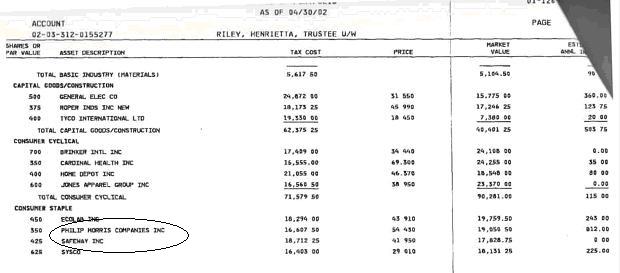Because someone, someone who misused their authority as financial information of such as is posted online relative to this trust is confidential communication between a financial planner, accountant, board of trustees and beneficiary of the trust; it's revealed the mutual funds owned by the Riley Trust have a "consumer staples/consumer goods" component, and one of the stocks in that component is Phillip Morris.
It's a completely immaterial amount of money and it's not generated by securities that are able to be traded, unless the entire mutual fund is sold off.
This is another fine example of people who have an axe to grind with Jehovah's Witnesses doing a whole lot of work to produce a "smoking gun" that really is nothing of the kind.
This stems from some financial information that was released related to a lady named Henrietta Riley. Apparently a wealthy JW that made the Watchtower Society the beneficiary of the income from her trust. Ms. Riley's financial planners had only her financial interests at heart when managing her investments.
This site has some financial information displayed:
http://www.jwfacts.com/watchtower/politics.php
The brokerage statement (the second image at the very bottom) reveals, not that she owned Philip Morris stock, but that she owned part of a mutual fund which held Philip Morris stock.
It's doubtful to me that Ms. Riley managed her own stock portfolio, so it's doubtful she knew every stock that made up the mutual fund displayed in that part of a brokerage statement, and impossible that she actually went out and directed her agent to buy the stock specifically.
After all she was running some sort of almost 2,000,000.00/year rental operation which made up the vast majority of the income of her trust.
Her total revenues were $1,783,647.00 (not including capital losses) and her interest and dividend income was $63,023.00. If I'm reading that last column, the title of which is obscured, correctly, the actual income generated by the Philip Morris stock was $912.00.
Summed up, about 3.5% of Ms. Riley's Trust's income was generated by interest and dividends, and the dividend income from PM-.05% of the income.
Tobacco companies have been sued in last 15 years prominently since Tobacco whistleblower Jeffrey Wigand, Ph.D. made some information public on 60 Minutes.
- March 2001: The Supreme Court affirmed the Circuit Court's ruling that the Food and Drug Administration could not class tobacco as a pharmaceutical, so could not control its production through the Food, Drug and Cosmetic Act. (FDA v. Brown & Williamson Tobacco Corp.)
- June 2002: A District Court in Kansas awarded $15 million in punitive damages against R.J. Reynolds Tobacco after calling the company's conduct "highly blameworthy and deserving of significant punishment." (David Burton vs. R.J. Reynold's Tobacco)
- June 2002: A Miami jury held three cigarette companies liable for $37.5 million in a lawsuit involving an ex–smoker who lost his tongue to tobacco–related oral cancer. (Lukacs vs. Phillip Morris)
- October 2002: A Los Angeles jury issued $28 billion in punitive damages against Phillip Morris. This was later reduced to $28 million. (Betty Bullock vs. Phillip Morris)
- 2004: A New York jury issued $20 million to the wife of a long-term smoker who died of lung cancer at the age of 57. This was the first time that a New York court had held a tobacco company liable for an individual smoker's death. (Gladys Frankson vs. Brown and Williams Tobacco Corp)
What is some of this money used for? Anti-smoking campaigns.
http://en.wikipedia.org/wiki/TheTruth.com
The truth campaign was modelled after an anti-smoking campaign in Florida. Florida's Office of Tobacco Control formed the Florida Tobacco Pilot Program in 1997. The program set out to drive a wedge between the tobacco industry's advertising and a youth audience. The program not only assembled a team of advertising and public relations firms to develop the marketing portion of the campaign, but also directly polled Florida's youth. From this emerged the campaign concept of a youth movement against tobacco companies promoted through grassroots advocacy and a youth-driven advertising campaign.
The American Legacy Foundation receives the majority of its funding from payments to the National Public Education Fund established by the Master Settlement Agreement. The MSA called for payments to the fund for five years and thereafter for years in which the tobacco companies participating in the agreement collectively have a 99.05% market share. The foundation received what is likely the last guaranteed payment in 2003. The participating manufacturers’ share does not currently meet the threshold and is not expected to in the foreseeable future. As a result, the foundation and the truth campaign are now facing a serious funding challenge. Efforts are being made to raise funds to continue the truth campaign as well as continue funding the foundation’s other programs.
Phillip Morris funded or is funding an anti-smoking campaign. I see that as a good thing.
How You Can Quit Smoking - Jehovah's Witnesses Official Web Site



